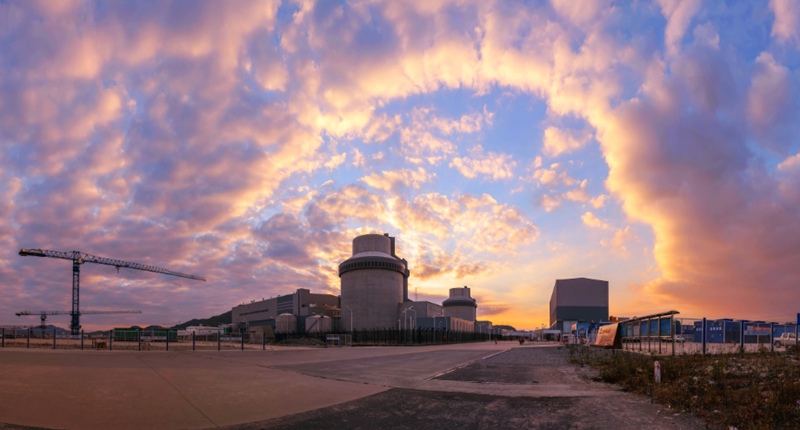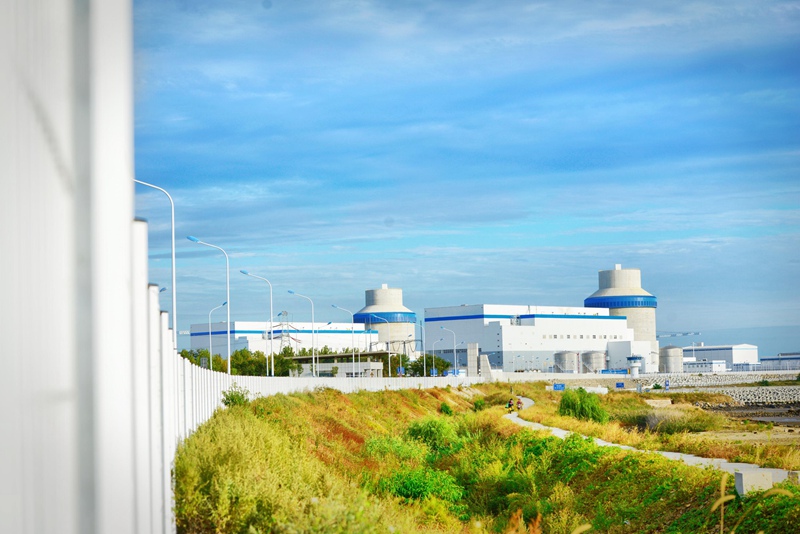


(Photo provided by SPIC)
A media team from Turkey concluded its one-week trip to China on Nov. 24, 2019, during which time journalists from the Turkish Ahaber Channel visited SPIC’s Shanghai and Shandong nuclear power projects, focusing on China’s independent CAP1400 nuclear power technology and nuclear power plant operation safety.
According to data from the Turkish government, more than 20 percent of the country's total energy demand is satisfied by coal power, which remains the primary source of electricity in Turkey. However, its negative impact on the environment also plagues Turkey. Data shows that each 1GW-class nuclear power plant only needs about 30 tonnes of nuclear fuel each year, while a thermal power station of the same size has to burn 3 million tonnes of coal each year. In addition, coal combustion brings emissions of CO2, SO2 and other gases, which puts pressure on the environment.
A poll conducted in 2018 by Konda, a climate information center and research company in Turkey, showed that most Turks were worried about climate change. In this context, as an efficient and clean energy source, nuclear power is gradually receiving attention in Turkey. In recent years, the country, which has been working to improve the domestic energy supply system, is actively developing nuclear power and has already built two nuclear power plants.
Meanwhile, in China, the nuclear power industry is facing strategic opportunities as a complete and mature nuclear power industry system has been established. China’s capacities for both major nuclear power equipment manufacturing and nuclear power plant construction are first in the world. Xu Yuming, Deputy Director of the Expert Committee of the China Nuclear Energy Association, believes that it is the right time for China to develop its global nuclear power industry, as the demand for nuclear power is growing around the world. For instance, the Vice Minister of Energy and Natural Resources Department of Turkey led a delegation to visit SPIC’s headquarter in 2017, at the same time as China was planning to participate in the construction of Turkey’s third nuclear power plant.
According to official data, some 45 countries worldwide, including China and Turkey, are now actively considering the promotion of nuclear energy projects. In light of this, China-Turkey cooperation in nuclear energy has been added to the agenda. At the “Belt and Road” Energy Ministerial Conference in October 2018, Turkish Foreign Minister Mevlut Cavusoglu stated that Turkey fully supports the “Belt and Road” Initiative and is trying to integrate it with Turkey’s “Middle Corridor” Project. The fast dovetailing of the “Belt and Road” Initiative and Turkey’s “Middle Corridor” Project provides a huge opportunity for the two countries to deepen their nuclear energy cooperation. Recently, in an exclusive interview with People’s Daily Overseas Edition, the Turkish Ambassador to China Emin Onen expressed that Turkey hopes to strengthen cooperation with China in nuclear power in the future.

(Photo provided by SPIC)
On August 21, the Chinese Nuclear Society announced that by the end of June 2019, the Chinese mainland had 47 nuclear power units in operation with an installed capacity of 48.73GW, ranking third in the world. “China’s independent innovation system for nuclear power has been continuously improved,” said Wang Shoujun, Chairman of the Chinese Nuclear Society. “A growing proportion of key nuclear power equipment and materials are produced domestically, with Hualong-1 and CAP1400 representing China’s most advanced self-developed 3rd-generation nuclear power technology,” he added.
“SPIC will participate in the construction of Turkish NPPs and adopt CAP1400 technology to four nuclear power units, which means that as China’s advanced nuclear power technology is growing globally, it will further benefit Turkey’s energy construction,” said Hao Hongsheng, General Manager of the SPIC Nuclear Energy Department.
The State Nuclear Power Technology Corporation developed CAP1400 with independent intellectual property rights. It is an advanced third-generation nuclear power technology with a power generation capacity of 1.5GW.
Each nuclear power unit can generate 11.4 TWh per year. The annual power generation of a nuclear power base, which contains eight CAP1400 nuclear power units, is almost equivalent to the Three Gorges hydropower station.
Although nuclear power is efficient and environmentally friendly, there is still public concern about its safety due to a lack of understanding. In order to dispel public doubt, the Ahaber Channel media team made an in-depth visit to the nuclear power plant to learn the operating principles of China’s CAP1400 technology, and inspected how nuclear safety was effectively guaranteed.
As the latest generation of nuclear reactors in operation, CAP1400 has much higher requirements for production safety and economy. It adopts a passive system when under power outage conditions. Reactors can automatically ensure safety without manual intervention in the 72 hours after an accident. At the same time, CAP1400 applies passive safety systems to increase the power station’s ability against extreme natural disasters, such as earthquakes and external flooding. The overall power station and main equipment have a 60-year lifespan. Moreover, it is easier to operate and maintain than past generations.
In 2016, China’s National Development and Reform Commission and National Energy Administration jointly released the “Thirteenth Five-Year Plan” for Power Development, which proposed that China’s nuclear power operation and installed capacity will reach 88GW by 2020. In the same year, China-Turkey nuclear power cooperation also embraced new opportunities. As Turkey officially announced the cooperation on the peaceful use of nuclear energy with China, the China-Turkey nuclear energy cooperation agreement formally entered into force.
In the past three years, China’s nuclear power technology has continuously developed, and these technologies and safety concepts will also enter into Turkey through cooperation. As Hao said, China’s participation in the construction of Turkish nuclear power plants will further meet Turkey’s demands for clean energy, and the cooperation between energy companies of the two countries will also benefit local people in terms of employment and taxation.

 Award-winning photos show poverty reduction achievements in NE China's Jilin province
Award-winning photos show poverty reduction achievements in NE China's Jilin province People dance to greet advent of New Year in Ameiqituo Town, Guizhou
People dance to greet advent of New Year in Ameiqituo Town, Guizhou Fire brigade in Shanghai holds group wedding
Fire brigade in Shanghai holds group wedding Tourists enjoy ice sculptures in Datan Town, north China
Tourists enjoy ice sculptures in Datan Town, north China Sunset scenery of Dayan Pagoda in Xi'an
Sunset scenery of Dayan Pagoda in Xi'an Tourists have fun at scenic spot in Nanlong Town, NW China
Tourists have fun at scenic spot in Nanlong Town, NW China Harbin attracts tourists by making best use of ice in winter
Harbin attracts tourists by making best use of ice in winter In pics: FIS Alpine Ski Women's World Cup Slalom
In pics: FIS Alpine Ski Women's World Cup Slalom Black-necked cranes rest at reservoir in Lhunzhub County, Lhasa
Black-necked cranes rest at reservoir in Lhunzhub County, Lhasa China's FAST telescope will be available to foreign scientists in April
China's FAST telescope will be available to foreign scientists in April